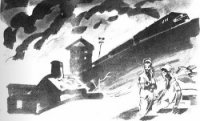Go Set a Watchman - Lee Harper (книги без регистрации полные версии TXT) 📗
In front of the chair in which he was sitting was a steel music stand, and on the stand was The Strange Case of Alger Hiss. Atticus leaned forward a little, the better to disapprove of what he was reading. A stranger would not have seen annoyance on Atticus’s face, for he seldom expressed it; a friend, however, would expect a dry “H-rm” to come soon: Atticus’s eyebrows were elevated, his mouth was a pleasant thin line.
“H-rm,” he said.
“What, dear?” said his sister.
“I don’t understand how a man like this can have the brass to give us his views on the Hiss case. It’s like Fenimore Cooper writin’ the Waverley Novels.”
“Why, dear?”
“He has a childlike faith in the integrity of civil servants and he seems to think Congress corresponds to their aristocracy. No understanding of American politics a-tall.”
His sister peered at the book’s dust jacket. “I’m not familiar with the author,” she said, thus condemning the book forever. “Well, don’t worry, dear. Shouldn’t they be here now?”
“I’m not worrying, Zandra.” Atticus glanced at his sister, amused. She was an impossible woman, but a sight better than having Jean Louise permanently home and miserable. When his daughter was miserable she prowled, and Atticus liked his women to be relaxed, not constantly emptying ashtrays.
He heard a car turn into the driveway, he heard two of its doors slam, then the front door slam. He carefully nudged the music stand away from him with his feet, made one futile attempt to rise from the deep armchair without using his hands, succeeded the second time, and had just balanced himself when Jean Louise was upon him. He suffered her embrace and returned it as best he could.
“Atticus—” she said.
“Put her suitcase in the bedroom, please, Hank,” said Atticus over her shoulder. “Thanks for meeting her.”
Jean Louise pecked at her aunt and missed, took a package of cigarettes from her bag, and hurled it at the sofa. “How’s the rheumatism, Aunty?”
“Some better, sweet.”
“Atticus?”
“Some better, sweet. Did you have a good trip down?”
“Yes sir.” She collapsed on the sofa. Hank returned from his chores, said, “Move over,” and sat down beside her.
Jean Louise yawned and stretched. “What’s the news?” she asked. “All I get these days is reading between the lines in the Maycomb Tribune. You all never write me anything.”
Alexandra said, “You saw of the death of Cousin Edgar’s boy. That was a mighty sad thing.”
Jean Louise saw Henry and her father exchange glances. Atticus said, “He came in late one afternoon hot from football practice and raided the Kappa Alpha icebox. He also ate a dozen bananas and washed ’em down with a pint of whiskey. An hour later he was dead. It wasn’t sad at all.”
Jean Louise said, “Whew.”
Alexandra said, “Atticus! You know he was Edgar’s baby boy.”
Henry said, “It was awful, Miss Alexandra.”
“Cousin Edgar still courtin’ you, Aunty?” asked Jean Louise. “Looks like after eleven years he’d ask you to marry him.”
Atticus raised his eyebrows in warning. He watched his daughter’s daemon rise and dominate her: her eyebrows, like his, were lifted, the heavy-lidded eyes beneath them grew round, and one corner of her mouth was raised dangerously. When she looked thus, only God and Robert Browning knew what she was likely to say.
Her aunt protested. “Really, Jean Louise, Edgar is your father’s and my first cousin.”
“At this stage of the game, it shouldn’t make much difference, Aunty.”
Atticus asked quickly, “How did you leave the big city?”
“Right now I want to know about this big city. You two never write me any dirt. Aunty, I’m depending on you to give me a year’s news in fifteen minutes.” She patted Henry on the arm, more to keep him from starting a business conversation with Atticus than anything else. Henry interpreted it as a warm gesture and returned it.
“Well—” said Alexandra. “Well, you must have heard about the Merriweathers. That was a mighty sad thing.”
“What happened?”
“They’ve parted.”
“What?” said Jean Louise in genuine amazement. “You mean separated?”
“Yes,” her aunt nodded.
She turned to her father. “The Merriweathers? How long have they been married?”
Atticus looked at the ceiling, remembering. He was a precise man. “Forty-two years,” he said. “I was at their wedding.”
Alexandra said, “We first got wind of something wrong when they’d come to church and sit on opposite sides of the auditorium …”
Henry said, “They glared at each other for Sundays on end …”
Atticus said, “And the next thing you know they were in the office asking me to get ’em a divorce.”
“Did you?” Jean Louise looked at her father.
“I did.”
“On what grounds?”
“Adultery.”
Jean Louise shook her head in wonder. Lord, she thought, there must be something in the water—
Alexandra’s voice cut through her ruminations: “Jean Louise, did you come down on the train Like That?”
Caught offside, it took a moment for her to ascertain what her aunt meant by Like That.
“Oh—yessum,” she said, “but wait a minute, Aunty. I left New York stockinged, gloved, and shod. I put on these right after we passed Atlanta.”
Her aunt sniffed. “I do wish this time you’d try to dress better while you’re home. Folks in town get the wrong impression of you. They think you are—ah—slumming.”
Jean Louise had a sinking feeling. The Hundred Years’ War had progressed to approximately its twenty-sixth year with no indications of anything more than periods of uneasy truce.
“Aunty,” she said. “I’ve come home for two weeks of just sitting, pure and simple. I doubt if I’ll ever move from the house the whole time. I beat my brains out all year round—”
She stood up and went to the fireplace, glared at the mantelpiece, and turned around. “If the folks in Maycomb don’t get one impression, they’ll get another. They’re certainly not used to seeing me dressed up.” Her voice became patient: “Look, if I suddenly sprang on ’em fully clothed they’d say I’d gone New York. Now you come along and say they think I don’t care what they think when I go around in slacks. Good Lord, Aunty, Maycomb knows I didn’t wear anything but overalls till I started having the Curse—”
Atticus forgot his hands. He bent over to tie perfectly tied shoelaces and came up with a flushed but straight face. “That’ll do, Scout,” he said. “Apologize to your aunt. Don’t start a row the minute you get home.”
Jean Louise smiled at her father. When registering disapprobation, he always reverted back to her childhood nickname. She sighed. “I’m sorry, Aunty. I’m sorry, Hank. I am oppressed, Atticus.”
“Then go back to New York and be uninhibited.”
Alexandra stood up and smoothed the various whalebone ridges running up and down her person. “Did you have any dinner on the train?”
“Yessum,” she lied.
“Then how about coffee?”
“Please.”
“Hank?”
“Yessum, please.”
Alexandra left the room without consulting her brother. Jean Louise said, “Still haven’t learned to drink it?”
“No,” said her father.
“Whiskey either?”
“No.”
“Cigarettes and women?”
“No.”
“You have any fun these days?”
“I manage.”
Jean Louise made a golf grip with her hands. “How is it?” she asked.
“None of your business.”
“Can you still use a putter?”
“Yes.”
“You used to do pretty well for a blind man.”
Atticus said, “There’s nothing wrong with my—”
“Nothing except you just can’t see.”
“Would you care to prove that statement?”
“Yes sir. Tomorrow at three okay?”
“Yes—no. I’ve got a meeting on. How about Monday? Hank, do we have anything on for Monday afternoon?”
Hank stirred. “Nothing but that mortgage coming up at one. Shouldn’t take more than an hour.”




